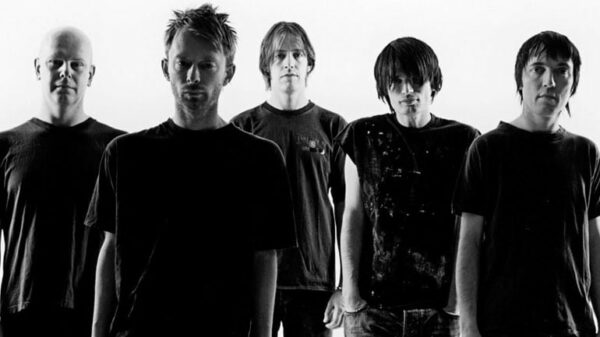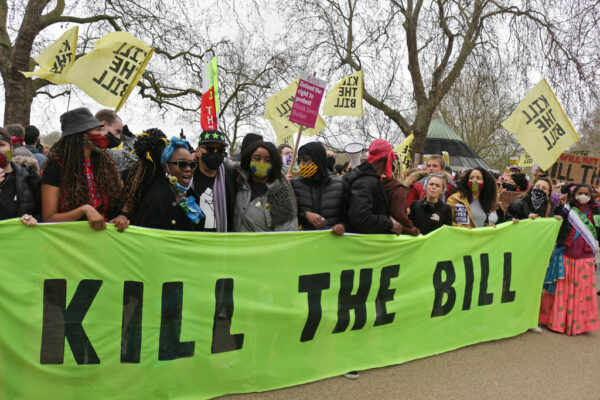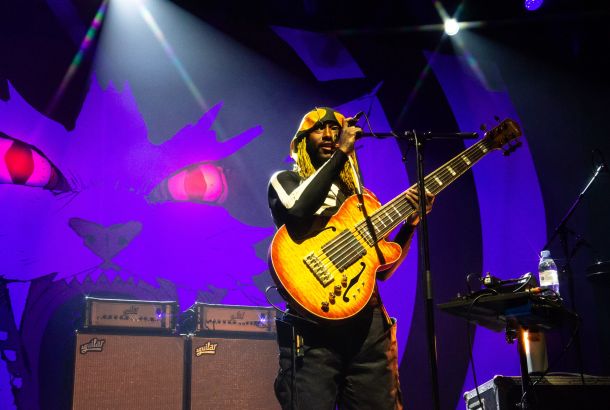Radiohead’s Hail to the Thief: 20 years on

Hail to the Thief is stated by the members of Radiohead to be their least favourite project, to them feeling clunky and unedited. However, this album’s subject matter, execution, and blend of styles culminated to become a beautiful interpretation of the modern world, that is more relevant than ever. After 20 years, what relevance does this project have today?
This album is drenched in fear and uncertainty, directly reflective of the surrounding world at the turn of the millennium. Over 14 songs, rich harmonic and melodic work festers into a furious breakdown of anger and helplessness that overtakes any individual in a world lurching towards ever darker crevasses. From outbursts of fury in ‘2 + 2 = 5’, to the raw vulnerability of ‘I Will’, or the final awakening in ‘A Wolf at the Door’, Hail to the Thief charts the growing insignificance of the individual.

Musically, this album reflects on the rocky styles of earlier Radiohead, yet we feel the abstract dystopia of Radiohead’s Kid A and Amnesiac remain. Modular synths, drum machines, and digitally altered guitars are presented as permanent, nagging doubts and fears to the arrangements of piano, percussion, guitar, and vocal parts.
‘2 + 2 = 5’ opens the album, with a nod to Orwell’s 1984, the themes of political control, and the futility of resistance, are already as plain as day. Screams of “Paying Attention” during the breakdown create a sudden draw to this album that reveals the severity of the situation at hand. The juxtaposition between the drum machine underlay, while guitars soar overhead is reflective of a fundamental change in the world, a feeling of dystopia that lurks ever-present. These themes are furthered by the programmed march of “Backdrifts”, that hints at the Western world’s slide away from democracy and liberty at the time of the War on Terror.
There is also a vulnerability and humanity to this album. ‘Sail to the Moon’ is emotionally straining and evocative, as haunting piano accompanies lyrics that contemplate the unfortunate fate of humanity if nothing changes. This is also reflected in ‘I Will’, a song about the Gulf war, in which the anger of the lyrical content is allowed to shine through the simplicity of guitar, and beautiful, yet tense, vocal harmonies. Having recently become a father at the time of recording, Yorke’s deep-rooted fears about what awaited humanity come to the fore here, and become a touchstone for us all to reflect on what we want the future to hold.
Despite the abstract nature of many of the themes already touched upon, the end of the album brings the listener back down to earth. In three-and-a-half minutes we hear the true fury of Yorke come to fruition, with references to contemporary political events, dystopian fiction, and the ignorance of privileged upper classes. Selway’s drumming ranges from a subdued, rhythmic pattern to the beating of the crash cymbals and snare runs that follow the call to action that this song is. Layers of strings, synths, and guitar parts build to a swell that really makes you stand to attention as we are told all that we need to know about the world in which we live.
Going to Los Angeles and recording the album in two weeks, this project was a departure from the agonising process of Kid A and Amnesiac, a burst of creativity that is heavily reflected in the album through a great impetus and urgency to shout its message as loud as possible.
Yet what is the importance of this album today? Hail to the Thief remains relevant in its questions and subjects, and the internal turmoil that it embodies is more powerful and overwhelming than ever. I don’t believe it is a political manifesto, or protest album, but the reflection of the diminishing place of the individual.
Inspiring this feeling in 2003 was the War on Terror, that saw Western governments push closer towards authoritarianism than was comfortable. This feeling remains today. As the Conservatives crack down on the right to protest or strike, and radical conservative forces in the US destroy fundamental human liberties, we sink deeper into these fears of losing the very things that define our society; melodic beauty in the face of screaming synths.
Populist politics has left us more divided than ever, and the aggressive tones of this album, that threaten violence and danger: “We can wipe you out”, seem to reflect the growing aggression of political life, with ever less humanity. The individual becomes helpless in the relentless lurch of power politics.

The early 2000’s also saw concerns beyond this, as the capitalist drive for production and consumption expanded to commodify everything in reach, as embodied by the cover of this album. As our earthly desires were boiled down to advertisements, our arts and escapism marketised and manufactured, a spiralling towards human insignificance began. In the album, this manifested as a feeling of isolation and helplessness in a world growing beyond its boundaries.
As modern media feeds us with a volume of content that is impossible to comprehend, the barrage of opinions, and the exposure to the abhorrence of the world, all the time, we become lost. This is a feeling, perfectly distilled in the anguishing restlessness of Hail to the Thief, with so much to do and so much to say, but never anywhere to do it, never anyone to hear it, and never any time.
Overall, at the heart of this album, is fear; the logical consequence of these existential issues. As climate change threatens to drown us, starve us or boil us, as war and extremism grow in places we never expected to see them again, as the fundamental values we took for granted become undermined, Yorke’s lullabies, written to his son, inspired by the childlike innocence of Bagpuss, may be all the hope we can cling on to. Maybe our presidents will find right from wrong, but if not, we will need that Ark.
Yet, this is not to fall into the nihilistic trope that surrounds Radiohead. This album is particularly poignant for young people today as it encapsulates the world we have grown up in. The fear of the millennium had gone from the esoteric and mysterious unknown of Kid A, to the sadistic beauty of the 21st century. By encapsulating the feelings that have surrounded us, I find this work a tool for introspection, to reflect on these issues and question them.
Through the music, we can take a step back, look at what is in front of us, and begin to compartmentalise and comprehend these feelings, to discover what we can do within all this. Existentialism is presented with clarity, and understanding is the first step to change.







